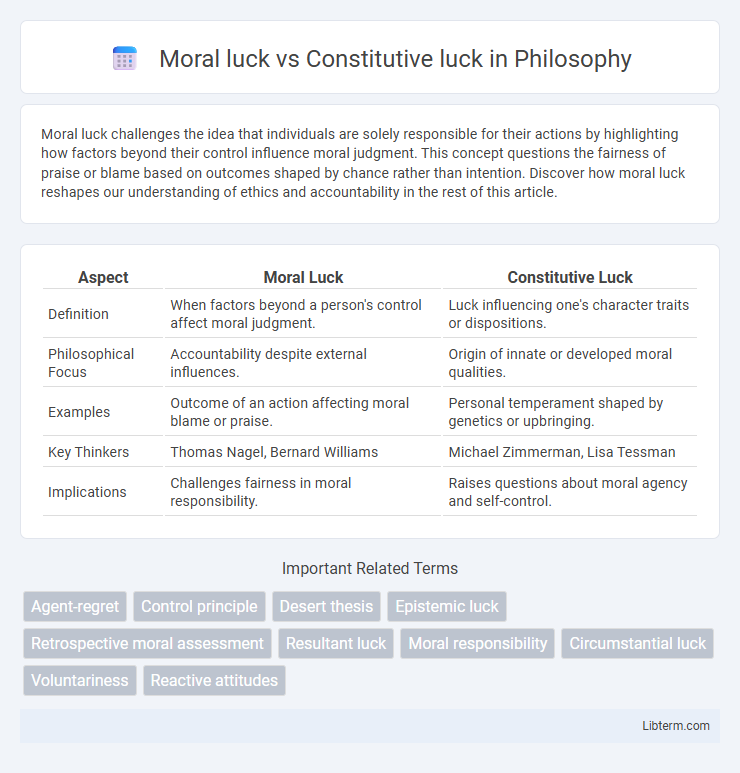Moral luck challenges the idea that individuals are solely responsible for their actions by highlighting how factors beyond their control influence moral judgment. This concept questions the fairness of praise or blame based on outcomes shaped by chance rather than intention. Discover how moral luck reshapes our understanding of ethics and accountability in the rest of this article.
Table of Comparison
| Aspect | Moral Luck | Constitutive Luck |
|---|---|---|
| Definition | When factors beyond a person's control affect moral judgment. | Luck influencing one's character traits or dispositions. |
| Philosophical Focus | Accountability despite external influences. | Origin of innate or developed moral qualities. |
| Examples | Outcome of an action affecting moral blame or praise. | Personal temperament shaped by genetics or upbringing. |
| Key Thinkers | Thomas Nagel, Bernard Williams | Michael Zimmerman, Lisa Tessman |
| Implications | Challenges fairness in moral responsibility. | Raises questions about moral agency and self-control. |
Understanding Moral Luck
Moral luck refers to the phenomenon where individuals are judged morally for actions influenced by factors beyond their control, while constitutive luck involves the traits and dispositions one inherits or develops. Understanding moral luck requires analyzing how external circumstances and inherent characteristics shape moral responsibility. This distinction highlights the complexity of assigning blame or praise when outcomes and personal traits are often shaped by luck.
Defining Constitutive Luck
Constitutive luck refers to the aspects of an individual's character, traits, and dispositions that are shaped by factors beyond their control, such as genetics, upbringing, and environment. It contrasts with moral luck, which involves the external circumstances affecting the outcomes of one's actions. Understanding constitutive luck is essential for evaluating moral responsibility because it highlights how unchosen internal attributes influence behavior and decision-making.
The Philosophical Origins of Moral Luck
Moral luck originates from philosophical debates exploring how factors beyond an individual's control influence moral judgment, challenging traditional notions of moral responsibility. Constitutive luck, a key category identified by philosopher Thomas Nagel, refers to luck in one's traits and dispositions that shape moral character. These discussions trace back to Aristotle's ethics and Kantian moral philosophy, where the tension between control and moral assessment first gained prominence.
Types of Moral Luck
Moral luck includes four key types: resultant luck, which concerns the outcomes of actions beyond an agent's control; circumstantial luck, involving the situations a person encounters that influence moral judgment; and causal luck, referring to factors that shape an agent's character or decisions. Constitutive luck specifically relates to the traits, dispositions, and inclinations a person is born with, shaping their moral behavior. Understanding these distinctions is essential in ethics debates, particularly on how much control individuals have over their moral responsibility.
Constitutive Luck: Nature, Nurture, and Character
Constitutive luck refers to the aspects of a person's character, personality, and dispositions shaped by factors beyond their control, such as genetics (nature) and upbringing (nurture). These elements influence moral responsibility since they determine the traits that frame an individual's choices and behaviors. Understanding constitutive luck highlights how inherent qualities and environmental conditions contribute to the moral evaluation of actions.
Key Differences: Moral Luck vs Constitutive Luck
Moral luck refers to situations where factors beyond a person's control influence the moral judgment of their actions, such as outcomes or circumstances impacting perceived responsibility. Constitutive luck involves traits and dispositions, including personality and character, shaped by genetics and early environment, which affect moral behavior but are not subject to voluntary control. The key difference lies in moral luck assessing external consequences or situational factors, while constitutive luck centers on inherent qualities that define an individual's ethical capabilities.
Moral Responsibility Amid Luck
Moral luck challenges the idea that individuals are fully responsible for actions influenced by factors beyond their control, such as outcomes or circumstances, while constitutive luck pertains to the traits and dispositions one inherits or develops. The tension between moral responsibility and luck raises questions about justice in holding people accountable when luck shapes their character or decisions. Understanding this dynamic is essential for fair judgments in ethics, law, and social evaluations where uncontrollable factors impact moral assessments.
Case Studies Illustrating Moral and Constitutive Luck
Case studies in moral luck often highlight scenarios where individuals face ethical judgments based on outcomes beyond their control, such as a drunk driver causing an accident versus one who does not. Constitutive luck examples analyze how inherent traits, like temperament or intelligence shaped by genetics and upbringing, influence moral responsibility, as seen in assessments of criminals with adverse childhoods. These distinctions deepen understanding of accountability by illustrating how external circumstances and inherent characteristics shape moral evaluations.
Philosophical Debates and Critiques
Moral luck challenges traditional notions of ethical responsibility by questioning how factors beyond an individual's control influence moral judgment, highlighting tensions in assigning praise or blame. Constitutive luck, involving inherent traits and dispositions shaped by genetics and upbringing, raises debates on the extent to which individuals can be held accountable for their character and actions. Philosophical critiques focus on the implications of these concepts for fairness in moral assessment, often questioning whether true moral responsibility is compatible with the pervasive influence of luck.
Implications for Ethics and Justice
Moral luck challenges traditional notions of ethical responsibility by highlighting how factors beyond an individual's control influence moral judgment, complicating fairness in assigning blame or praise. Constitutive luck, referring to the traits and dispositions one inherits or develops without choice, further questions the justice of holding individuals fully accountable for their actions. These concepts imply that ethical and judicial systems must account for uncontrollable circumstances to ensure more equitable evaluations of moral agency and accountability.
Moral luck Infographic

 libterm.com
libterm.com